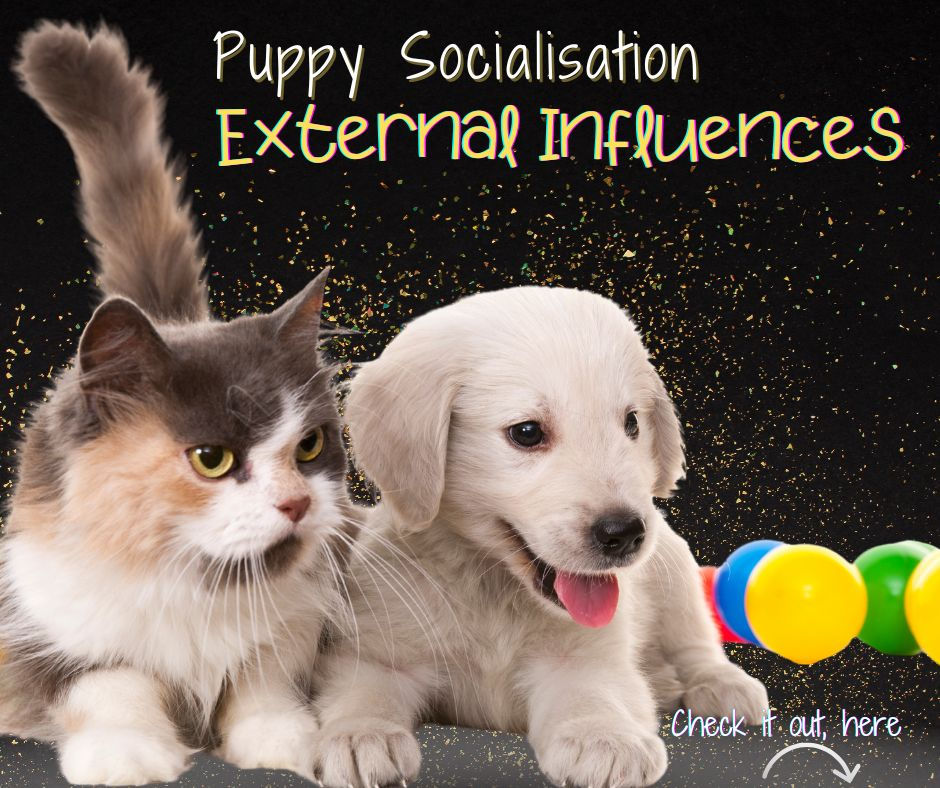Puppy Socialisation - External Influences
- Paws Academy

- Mar 7, 2023
- 4 min read
Updated: Feb 26

The phenotype of every dog is informed by external influences such as the dogs genetic make-up and the dogs breeding. The puppies first formative experiences will take place in the womb during development of the foetus during pregnancy. Therefore, puppies who may be born to a dam in poor condition and malnourished will be poorly developed at birth. These puppies may then also struggle to develop into healthy puppies, as the dam may produce insufficient milk during the lactation period.
By the time a litter of puppies have been born, they will have already had different gestation experiences, which then form their morphology, health, disposition and influence their behaviour in later life. The position of the puppy in the womb, the amount of nutrition, the formation of the puppies immune system will be different for every puppy, and this will affect the dogs development as it matures.
In addition, the birth process for each puppy will also have an effect on their emotional response to the world, particularly if the birthing process is traumatic and/or if the pregnant dam is stressed, as this can also help shape the puppies in terms of their disposition and character traits. This can be seen with studies that have taken place suggesting that the limbic regions in the developing brain can be particularly sensitive to the stress hormone cortisol.
The neonatal period is important for the puppies in terms of their social development and stress responses. These early life experiences help to have shape and form the puppies responses to the environment.
During the neonatal period, the puppy also starts socialisation and habituation. Socialisation is the process where the puppy learns to interact with its own species (conspecifics) and other species.
This process is affected by interaction with the dam, litter mates and other people/animals encountered in the dog's early life. Habituation is the process of becoming accustomed to environmental factors (such as external stimuli and new experiences).
Early socialisation by responsible breeders will mean that the puppies are more likely to respond to new experiences and situations calmly and with more confidences that puppies who have not had exposure to socialisation and habituation before they leave the dam (think puppy farms/mills and dogs which are bred outside with little human contact and minimal exposure to the sights, sounds and smells that they will encounter in their new homes)
All dogs base reactions to a new stimulus are based on the previous experience of that stimulus, therefore if a puppy is born into a home where there are regular sounds of domestic appliances, they are more likely to get habituated to those sounds once they are in their new home. This applies to any new experiences, such as meeting people, dogs and other animals etc. The dogs first experience of any new stimulus will form their consequent reactions to the same or similar stimuli which is why it is so important that new experiences for the young puppy are always positive.
Social receptivity in the dogs brain is between the 5-to-9-week period, during which time there is a large amount of cognitive processing. This can also be referred to as the ‘fear’ period and is the development phase where puppies are more sensitised to experiences. As the puppy will be experiencing highly sensitive experiences at this time, they may start to become fearful or anxious of stimuli that they previously did not or showed little reaction to.
Fear is a normal response to an actual or perceived threatening stimulus or situation. Anxiety becomes a conditioned response to fear and is frequently based on apprehension when a dog anticipates a threat or fearful situation. The below are common experiences that the puppy may react fearfully towards during a ‘fear period’:
· Unfamiliar people
· Other dogs/animals
· Inanimate stimuli (loud bangs, fireworks, lorries, Hi-Viz, uniforms etc)
· Vet Clinics / Grooming parlours
If the puppy is managed consistently and calmly and given distance from what they are perceiving as the stressor, given time and freedom (loose lead etc) to approach at the dogs pace, then they are likely to overcome that uncertainty. However, if this response is not managed correctly, then there is a strong possibility that the puppy may develop a long-term aversion towards the stimuli which has provoked the reaction.
This can then have significant implications for socialising with other dogs, people etc, and many teenage dogs will develop issues with other dogs behave they have been approached by over-exuberant dogs have intimidated them during a ‘fear period’. If subsequent experiences with dogs during this period are calm and well managed, then the puppy is likely to overcome her uncertainties. However, if the dog is repeatably exposure to the situation that they find overwhelming, they may go onto develop issues with these situations in later life.
It is impossible to anticipate the associations that a puppy’s brain may make when they experience any negative, which is why it is so important to habituate her to all new experiences gradually, allowing the dog to make the choices in the terms of speed and direction of their approach.
Want to know more? Or need any help with training? Please drop us a line, we would be happy to support.



